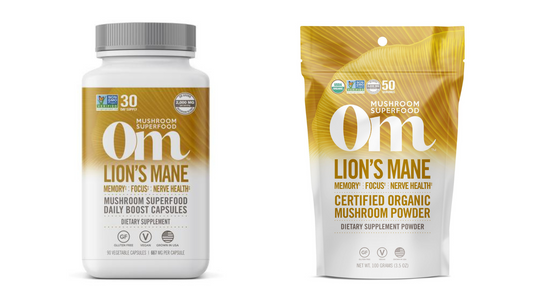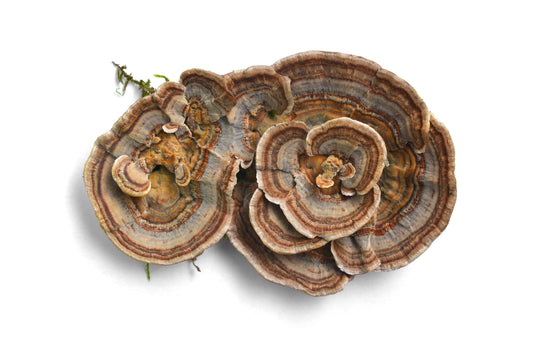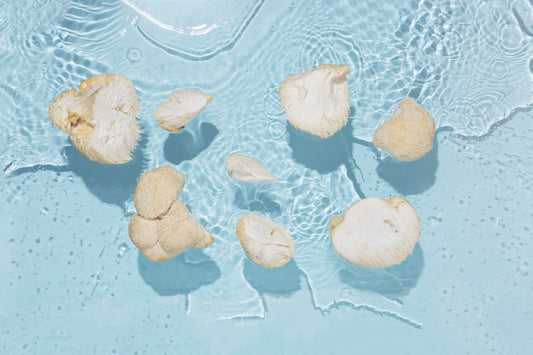Mushrooms are a fascinating subset of the fungal kingdom. While more than 10,000 species have been identified, it is believed that there are many more yet to be discovered. These fungi may be classified by their physical structures or where and how they grow. They are also occasionally sorted by their uses in the agricultural, industrial, culinary, nutraceutical, and other fields.
Functional mushrooms are a special category. Long revered for their use in traditional medicine, they are also the subject of modern medical research. Two species in particular are turning heads thanks to their supportive health effects. Turkey tail vs. lion’s mane—by comparing their similarities and differences, you can determine which of these extraordinary mushroom species is right for you.
Why Choose Functional Mushrooms?
Functional mushroom species have a lot going for them. This exceptional group of fungi is not only nutritious, but can also help support your health in a variety of unique and interesting ways. Low in fat, mushrooms contain a variety of nutrients including essential amino acids, vitamins, and minerals accumulated from the decomposition of plants. In short, these mushrooms are a good fit for any diet.
It is their many characteristic phytochemicals and bioactive compounds, however, that make functional mushrooms the supplement of choice for many people around the world. They include antioxidants to help combat oxidative damage.‡ They also include polysaccharides—complex carbohydrates that support immune system and digestive health.‡ Taking a daily functional mushroom supplement is a convenient way to obtain the nutritional and health benefits of these fungal powerhouses.
Turkey Tail vs. Lion’s Mane: How They Stack Up
While turkey tail and lion’s mane do share some characteristics, each has its own value as a nutraceutical and dietary supplement. Understanding their similarities and differences will help you determine their potential utility. Here’s a quick breakdown of both mushroom species:
|
Turkey Tail (Trametes versicolor) |
Lion’s Mane (Hericium erinaceus) |
|
|
Type of Mushroom |
Saprophytic - produces enzymes that break down dead, decaying plant matter |
Parasitic/saprophytic - grows on living or decaying plant matter |
|
Appearance of Fruit Body |
Contrasting bands of colored stripes on bracket-shaped mushrooms |
Shaggy globes covered in white or off-white spines |
|
Uses |
Nutraceutical/supplement |
Culinary or nutraceutical/supplement |
|
Characteristic Bioactive Compounds |
|
|
|
Where It Grows |
Widespread distribution throughout North America, Europe, and Asia |
Widespread distribution throughout North America, Europe, and Asia |
|
Main Uses |
|
|
|
Available As |
Whole mushroom powders, capsules, extracts, and food products (broths, drink mixes, etc.) |
Whole food powders, capsules, extracts, and food products (broths, drink mixes, coffee creamers, etc.) |
Below are a few additional considerations when deciding between turkey tail vs. lion’s mane:
Distribution
While turkey tail and lion’s mane are widely distributed throughout the northern hemisphere, they have both also been successfully cultivated by mycologists—scientists who specialize in fungi. Sustainably growing and processing functional mushrooms is an effective way to combat the overharvesting of wild-grown turkey tail and lion’s mane. It also allows growers to filter out any environmental toxins that can accumulate naturally in mushrooms, thereby making them safe products for consumption.
Uses
When freshly available, lion’s mane is a popular culinary mushroom with a delicate crab or lobster flavor. Turkey tail has a tougher, woody texture. For this reason, turkey tail is usually dried and made into tea or used in powder form.
When choosing between turkey tail vs. lion’s mane, you’ll want to first consider your personal health goals. For those desiring a product that provides brain and nervous system support, lion’s mane is a nootropic standout. Its associated cognitive and mood effects make it the clear choice for anyone looking to sharpen their focus and promote mental clarity.‡
Turkey tail is one of the most commonly researched and cited mushrooms for immunomodulation. With its impressive array of potent polysaccharides, it is the premium choice to help support a healthy immune system.‡
Choosing Single Mushroom or Multi-Species Products
Both turkey tail and lion’s mane are available as dietary supplements. Om Mushroom Superfood offers many whole food, organic mushroom products that contain the optimal doses of these functional mushroom species. They are cultivated in specialized environments to optimize growing conditions and eliminate contaminants.
For the nootropic benefits of lion’s mane, Om offers a whole mushroom, organic powder blend that promotes the bioactive benefits of both mycelium and fruit bodies. It is available as a fine powder for easy mixing into beverages or your favorite recipes. The same high-quality powder is also available as a convenient capsule. Our newest lion’s mane products include nondairy coffee creamers that combine oat milk with 500mg of lion’s mane extract per serving in either vanilla, Mexican chocolate, or unflavored varieties.
We’ve harnessed the power of turkey tail polysaccharides in our powders or capsules as well. Just a small serving each day contains enough beta glucans to activate your immune responses and support overall wellness.‡
Om Mushroom also offers multi-species products that combine turkey tail and lion’s mane with other functional mushrooms and 7-10g of protein. These mighty mushroom broths provide the complementary benefits of both turkey tail and lion’s mane, so there’s no need to choose. Mighty broths are available in beef, chicken, mushroom, or veggie miso flavors.
Turkey tail vs. lion’s mane—while both provide solid nutritional support, your choice will depend on your individual health and wellness goals. A lion’s mane supplement taken daily provides unmatched support for the brain and nervous system, while turkey tail promotes an efficient immune response.‡ Taking a curated blend that combines the best of both is a great way to provide synergistic support for your overall health.
[CTA]
‡These statements have not been evaluated by the Food and Drug Administration. Functional mushroom products are not intended to diagnose, treat, cure or prevent any disease.













